#nhk yorudora
Explore tagged Tumblr posts
Text
First review of the year, yay, and it’s for a GOOD ONE: the totally wonderful, heart-fulfilling She Loves to Cook and She Loves to Eat (Tsukuritai Onna to Tabetai Onna/TsukuTabe)! This was a GREAT DORAMA, with LOTS going on. I’m giving this the ultra-deep treatment, so: long post and spoilers!
(I know some folks had issues with finding the dorama to watch; please follow @furritsubs for all the info!)
I had posted an update on my viewing of the show earlier in December, and I’ll quickly review the context in which this show was aired, although my last post kinda explains things, too:
So I’ve written before that NHK, Japan’s largest broadcaster, doesn’t always mind taking risks with their shows, like the wonderful Life as a Girl and many more. As well, NHK has a number of different show formats, the most famous one being their asadoras, or 15-minute everyday morning dramas (asa = morning, dora = short for dorama). NHK also has a late-night 15-minute drama format called a yorudora, and TsukuTabe was their latest 10-episode installment before the end of 2022. (Many Japanese QL shows air in late-night slots -- like Kinou Nani Tabeta and Cherry Magic on TV Tokyo -- I think in part because they are considered more “adult” and/or not necessarily meant for primetime/family slots. However, the popularity of these shows, I think, far outweighs their airing times.)
So! A late-night GL by NHK. And one that’s reminiscent of a few other shows -- namely, the aforementioned Kinou Nani Tabeta and Cherry Magic, both of which I saw echoes of in TsukuTabe. (For the IMPORTANT record: this was my first GL. If I’m missing any obvious GL tropes, forgive me in advance. And NHK has not shied away from queer/lesbian content before, most notably 2019′s Mistress.)
The show is set up between two neighbors, Nomoto and Kasuga. Nomoto loves to cook, but doesn’t have a huge appetite. And she loves to cook HUGE PORTIONS. Who’s gonna eat a huge portion of food?
She finds Kasuga in her building one day, carrying loads of delivery, which Kasuga clarifies is just for herself. Nomoto’s intrigued. She helplessly makes a huge meal one night, hears Kasuga approaching, and invites her in -- and away we go.
A couple of themes that I’m reflecting on. First, food. Damn it: Japan just WINS AT FOOD DORAMAS. YOU WIN! Food doramas -- Wakako Zake, Kodoku no Gurume, Kinou Nani Tabeta, SO MANY MORE -- you just suck me in. I even cook from these shows! LOOK AT THIS!

Yes, it IS beautiful!
At least in my opinion, when themes of food and cooking are connected to QL content in Asian content, I think the design is intentional to draw in food-loving audiences that may otherwise NOT watch QL. I felt that strongly with Kinou Nani Tabeta, which was wildly successful in Japan, not withstanding the unbelievable casting and acting of the A-list actors, Nishijima Hidetoshi and Uchino Seiyou.
But what I loved first about TsukuTabe is that the themes of food and cooking were used to tell multiple story strands about Nomoto and Kasuga throughout the show. Whereas in KNT, it was the actual cooking and eating of dinner every night that shaped Shiro-san’s and Kenji’s permanent relationship together, Nomoto and Kasuga had individually defined, previous relationships with food and cooking that just so happened to coincide upon their meeting. For instance, Kasuga reveals that she eats tremendous portions to make up for a childhood that was very conservative and sexist, where she was made to eat smaller portions than her father and brother, and was oftentimes left hungry at night.
Nomoto herself reveals in the middle of the series to Kasuga that cooking for people makes her so happy that she can literally cry, and she does.
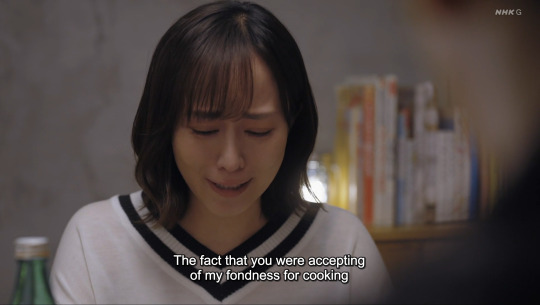
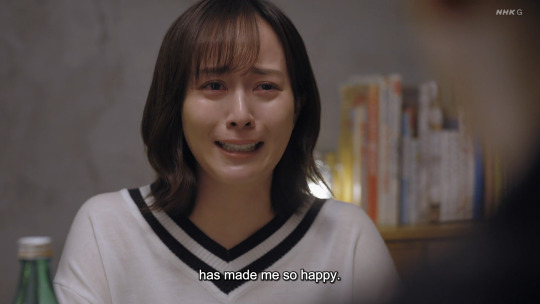
Nomoto hasn’t had anyone else in her life before who would respond to the huge portions she loves cooking. It could come off as transactional, but for Nomoto, it is not at all. Her huge portions of cooking are meant as an investment in another person. If another person ever responded to her huge portions with total abandon and appreciation, as Kasuga does -- then that person has totally fulfilled Nomoto’s emptiness.
But what I also love about this theme of cooking is that TsukuTabe uses it to make a distinct critique of male-oriented Japanese society -- in that Nomoto has previously been pegged as a family-oriented person for her love of cooking.

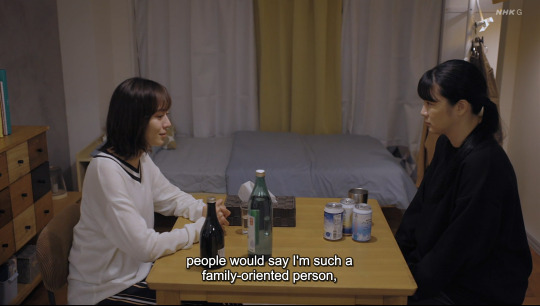



I LOVE THIS. Oooooh gosh, it is pointed and spicy. Oftentimes, I interpret cooking as a means of compassion and investment -- a definition of creating family through the intimacy of cooking and eating together.
BUT I LOVED THAT TsukuTabe turned this on its head. TsukuTabe’s storyline definitely checked me. Here, TsukuTabe points to its audience and says -- if you cook together, create a family together -- why does that responsibility always fall on women? Why does it always SEEM to fall on women? Even in the nostalgic gaze of adults reminiscing about their childhoods -- isn’t it usually the mothers making the home and table for their family? Do you KNOW what it TAKES for a mom to actually pull that shit off? I love that Nomoto calls bullshit on all of it in one shot.
And actually, KNT turned the tables a bit on this paradigm, too. KNT showed that a gay male couple could still say tadaima and okaeri to each other, to cook together, and to have dinner every night. I don’t think the KNT storylines were necessarily created as a critique of society, though -- those storylines were more meant to demonstrate to an audience that a gay male couple CAN be family. (EDITED TO ADD: the wonderful @bengiyo notes in the notes that KNT actually had quite a bit of critique about the way gay males are treated in society, and I totally agree, so I want to edit this post without hiding my previous content -- I think the writers of the KNT dorama and manga both handled the societal critiques in more subtle ways than in TsukuTabe. To reinterpret what I was trying to say about KNT -- I think the presentation of common familial practices in KNT was deliberate to demonstrate that those exact practices can absolutely be used in a same-sex relationship, helping a Japanese audience to see that family is family, no matter who’s in it.)
TsukuTabe does not shy away from the critiques. Besides this cooking-related storyline (I mean -- Kasuga literally being hungry as a child, chosen to receive less food than her younger brother -- BOTH of her parents were total misogynists), there’s also stories about equity told WITHIN the food itself.
In Japan, there are often assumptions held that between a cishet couple, a woman will eat less than a man. This concept is borne out in part by couples bowls, often given as wedding gifts, where one bowl is smaller than the other.
I actually first saw the trope of couples bowls in the second volume of the Old Fashion Cupcake manga. Togawa and Nozue are on a trip to an onsen, and are wandering the town in their onsen yukatas (very cute). They go into a ceramics store, and Nozue is silently struggling with wanting to get two bowls for himself and Togawa -- but all the couples bowl sets are different sizes. (The scene ends with the cashier leveraging her radar to create a set of two same-sized bowls for our darling Cupcakes.)
Kasuga is shown in the beginning of TsukuTabe at a restaurant ordering a karaage set. The shop’s master gives her less rice than the male customer sitting next to her. She seethes. And asks for more rice. She gets her full portion.
So we know that Nomoto eats less than Kasuga -- but I happen to really, deeply love the way this difference is portrayed in certain parts of the show, because I think it indicates that the series is treating this pairing as a cishet couple would normally be treated in everyday Japanese society -- the kind of society that TsukuTabe is very pointedly criticizing.
This scene depicts the gals eating haruko meshi, a salmon donburi topped with ikura (see footnote). I’m showing the first two screenshots purely for the GORGEOUS LOOKING DISH, HOLY EFF, but I love the overhead shot of their differing portions!



I love the looped critique shown in this shot, while also honing in on who Nomoto and Kasuga are, authentically. They’re gonna eat different portions because they’re different people, which, like, sometimes happens in a coupling. Why should they be treated differently than a cishet couple, simply for both being women? I think that’s what the show is saying.
AND: there’s a small but lovely resolution to this particular thread in the last episode. Kasuga takes Nomoto back to the restaurant where Kasuga was initially served less rice. The shopkeepers changed their policy, as Kasuga discovers -- and they ask all customers if they wanted a small, medium, or large portion of rice. Nomoto, of course, takes the small, and Kasuga takes the large.

Guh. I just love this. I really love the quiet critique happening in these shots, in these differing portions of food, that allow these two to be themselves while coming to terms with what it means for them to be spending time together.
So, speaking of spending time together, perhaps I saved the best for last in this review by analyzing the actual coupling of Nomoto and Kasuga together (but listen, okay, for me, the food ranks really high, REALLY HIGH).
Off the bat, the show doesn’t show any heat between these two. They don’t actually get together in the traditional sense -- no conversation about dating, no physicality, nothing. They just spend time together and talk and eat and cook. The manga itself only has three volumes in Japan, and I’m not even sure that they HAVE gotten together yet in the manga at present. I BELIEVE, by following Twitter and IG, that something MAY be brewing with them holding hands, but I’m honestly not sure yet. But back to the dorama:
Nomoto’s journey in this show is that she comes to realize that she is a lesbian, in love with Kasuga. In this case, her journey is similar to that of Ida in Kieta Hatsukoi, who begins to date Aoki, but doesn’t know what love feels like, because Ida has never dated before. He doesn’t know what it feels like, admits it, and wants to explore it.
So, Nomoto has never dated before. She’s talking about Kasuga to a co-worker, without revealing that Kasuga is a woman. The co-worker (HELLO, MORITA MISATO, LOVE YOU AND YOUR RISKY WORK) knocks Nomoto on the head with the obvious, which leaves Nomoto stunned:

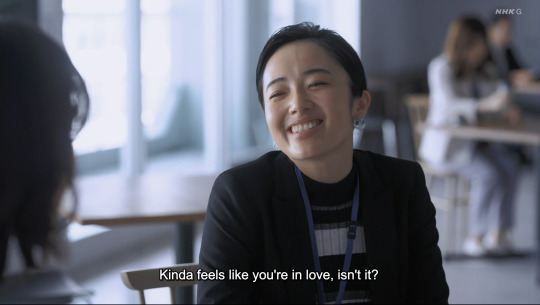
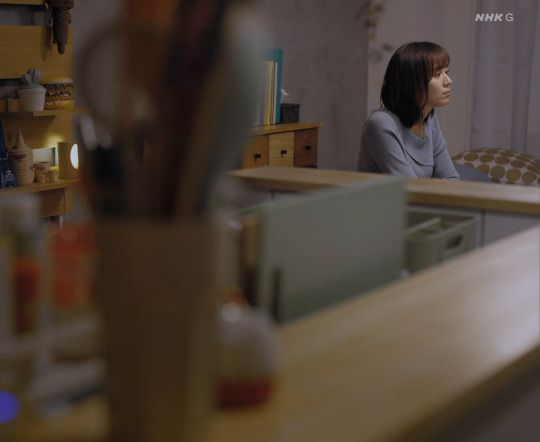
And Nomoto goes into reflection mode, thinking about her childhood and teenagehood, when her friends ask her who she likes and who she’s dating.
(But, before that happens, a quick note on colors, inspired by @respectthepetty, the best colors analyzer -- while Nomoto is in the dark for some time in her revelations, Kasuga sees the light, and it’s made clear in the show that she likes Nomoto, which lights up her lonely and otherwise previously dark life.)

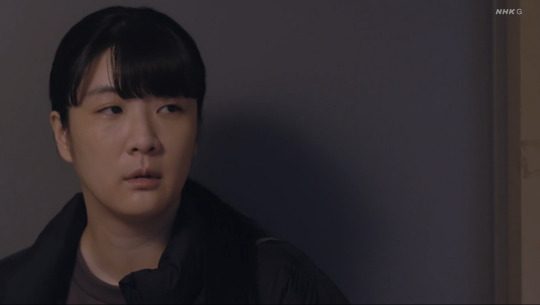
Much of Nomoto’s ultimate reflection on her past and her sexuality takes place in a literal fever dream, where she sees herself as a youngster, not relating to her friends (“everyone is dating now,” etc.). And then she sees Kasuga walking away.
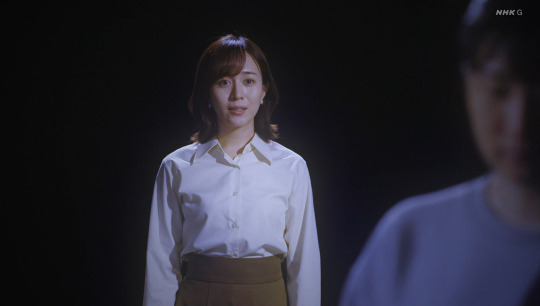
(Where else did we see this? In Cherry Magic: The Movie, when Adachi wakes up from his accident in a fright -- starting his journey to acknowledging Kurosawa as his life partner, both internally and externally.)


In Nomoto’s case: she recognizes that she needs to grapple with her past, and move from it.
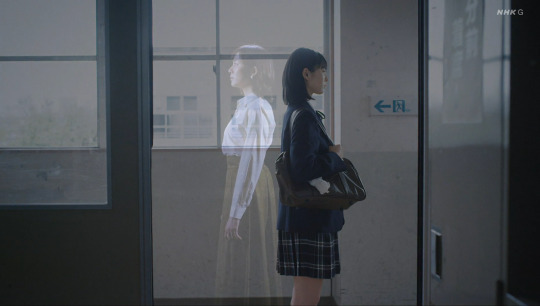
And then, Kasuga comes to Nomoto, food in hand, ready to care for Nomoto in her fever. As Nomoto eats alone after Kasuga departs, Nomoto finally acknowledges her feelings -- and is determined to be okay with them, no matter how society reacts to it, even saying it out loud.

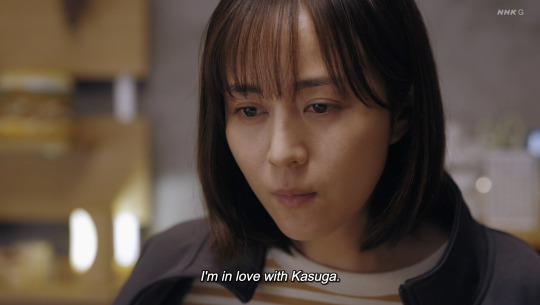
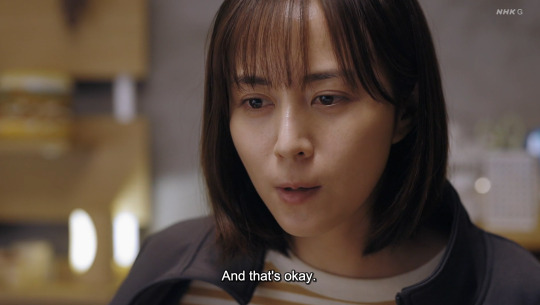
What I LOVE about the character of Nomoto is that she’s not ever particularly weighed down by society. She thumbs her nose at it. She certainly hears her mother’s demands to “find a nice guy to settle down with.” She grew up with friends who expected her to date men. Yet, throughout the entire show, gender equity is the forefront conversation, and you can see some of the fire in this last screenshot of Nomoto. It’s the same fire you see in her in the first volume of the translated manga -- Nomoto just doesn’t stand for inequitable bullshit. Her own revelations about her own sexuality needed some time to simmer -- but society will not keep her back from being who she is. I LOVE the way she is written. (And Higa Manami played her BEAUTIFULLY.)
The show ends with Nomoto seeing the light, standing beside Kasuga.

Again: they don’t officially get together. Nomoto acknowledges that what she will do is stand beside Kasuga. Because I don’t know where the manga currently stands with them being an actual couple, I can’t blame NHK for not pushing this envelope, but I do wonder a touch if some viewers were disappointed by not seeing a romantic acknowledgement between the two of them.
For me, it’s no matter, as y’all know I love a good and quiet dorama. (My god, the biggest show of last season in Japan, Silent -- that didn’t even end with a kiss, I was a little shocked!).
TsukuTabe took the assumed roles of women and totally spun them on their heads -- a tremendously important exercise in a country that is not famous for its gender equity.
Tackling two major critiques of society -- gender equity and LGBTQ rights -- this show took on a LOT, it did not shy away from it, and I deeply loved and appreciated this dorama for it. There was so much going on. Hunger and starvation leading to companionship and fulfillment. It was a beautiful show, and watching it was a great way to end 2022.
* * *
Two quick footnotes. First: the actress who plays Kasuga, Nishino Emi -- y’all should follow her if you’re on IG. She is SO SO SO COOL. She’s a great singer, great fashion taste, everything! She’s badass.
Secondly, aaahhhh, I kinda got obsessed with haruko meshi! Really quick: haruko meshi is from Miyagi Prefecture, where Nomoto is from, and is like a salmon sashimi and ikura donburi, but instead, the salmon is cooked with the rice with seasonings, like takikomi gohan. Kinou Nani Tabeta has a GREAT depiction of takikomi or kayaku gohan -- you can add mirin, sake, and shoyu to your rice cooker to cook the rice in those seasonings with other ingredients, like veggies, mushrooms, or even fish. If you have kids, make takikomi gohan -- I have never met a child who didn’t like seasoned rice!
Anyway, anything with ikura floats my boat, so I think I’ll have to make haruko meshi soon (although maybe without a ton of ikura since it’s so damn expensive), but holy fuck, doesn’t it look so good?!? AAAAHHH, I LOVE FOOD DORAMAAAAASS!
#tsukuritai onna to tabetai onna#tsukutabe#she loves to cook and she loves to eat#kinou nani tabeta?#cherry magic the movie#old fashion cupcake#food dorama#higa manami#nishino emi#nhk#nhk yorudora#yorudora#nomoto x kasuga#kasuga x nomoto
95 notes
·
View notes
Text
Elaiza Ikeda Set to Star in Komi Can't Communicate Live-action TV Drama in September
A live-action TV drama adaptation of Tomohito Oda's romantic comedy manga Komi Can't Communicate is set to be aired for six episodes on NHK General TV's "YoruDora" programming block from September 6, 2021. The manga has been serialized in Shogakukan's Weekly Shonen Sunday since 2016, and its TV anime adaptation has also been in the works for a premiere in October 2021.
25-year-old Philippine-born actress/fashion model Elaiza Ikeda plays its main heroine Shouko Komi. As an actress, she is well-known for her portrayal as Kirari Momobami in the Kakegurui live-action series. Also, the male protagonist Hitohito Tadano, who is a high school student in the original manga story, is played by 35-year-old Takahisa Masuda, a member of Johnny & Associates' male idol group NEWS. Toichiro Ruto, who recently attracted attention for his work on the gay drama Ossan's Love, serves as director on a script by Fumie Mizuhashi (Hotaru no Hikari, Scarlet).
Message from Elaiza Ikeda:
The more the world is overload with information, the more we compare ourselves to someone else. Everyday, we struggle with the definition of "normal" that keeps changing. This is a story that gently scoops up those precious feelings that we tend to leave behind in our busy lives. Know yourself, communicate, know and respect others. Enjoy the fact that we are different. I hope you will be healed by Komi-san and her friends who meet their precious friends while repeating these things. I'm under pressure because I've loved this series since the first volume was released, but I'll do my best to put everything I can into this drama. Please look forward to it!
よるドラ 【古見さんは、コミュ症です。】 只野くん #増田貴久 × 古見さん #池田エライザ 漫画週刊誌に人気連載中の原作をドラマ化!“人付き合い”でたまに胸が締め付けられる全ての人たちへ贈る物語 9/6(月)スタート 総合 毎週月曜 よる10:45#古見さん #komisanhttps://t.co/FB90PXSWqH
— NHKドラマ (@nhk_dramas) July 22, 2021
Manga tankobon 1st and 21st volume covers:
Source: NHK Drama official website / Twitter
©NHK (Japan Broadcasting Corporation).
©Tomohito Oda/Shogakukan
By: Mikikazu Komatsu
1 note
·
View note
Text
Live-Action 'She Loves to Cook, and She Loves to Eat' Drama Adaptation Gets Second Season
On Monday, NHK announced that its live-action drama adaptation of Sakaomi Yuzaki's slice of life Yuri Manga She Loves to Cook, and She Loves to Eat (Tsukuritai Onna to Tabetai Onna) is getting a sequel. The new series will have 20 total episodes, an increase from the first season's 10-episode run, and premiere in early 2024.

She Loves to Cook, and She Loves to Eat is based on Sakaomi Yuzaki's manga of the same name. It follows neighbors Nomoto, who likes to cook to destress, and Kasuga, who loves to eat. The two women bond over their shared love of food and slowly develop a more intimate relationship.

NHKs announcement makes She Loves to Cook and She Love to Eat the first program in the Networks "YoruDora" drama block to get a sequel. It will air Monday through Thursday at 10:45 pm.
Leads Manami Higa and Emi Nishino are set to reprise their roles as Nomoto and Kasuga, respectively. They will be joined by, as of yet, unannounced newcomers as new characters Yako and Nagumo from the original series' third volume.
The first season was broadcast from November to December last year. It was directed by Yui Matsusaki and Niroyuki Nakata, with script writing by Yuri Yamada, and music by Gorou Itou. The staff is also returning for the second season.
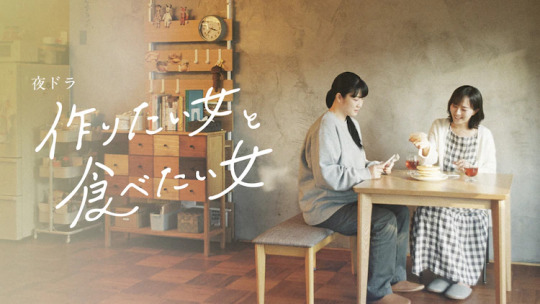
The manga's creator commented on the announcement, saying, "It's an honor just to have my work made into a drama. But I am extremely humbled to have it be the first in the block to have a sequel produced..." They went on to say, "I want to sit in front of the TV not just as the original author, but also as a fan and viewer. I'm really looking forward to it!
Both lead actors also commented on the announcement, expressing their excitement about the second season and the opportunity to reprise their roles and work alongside the crew again. Translations of their full comments are below.
Scriptwriter Yuri Yamada teased the contents of the upcoming second season, "In Season 2, we are increasing the elements of the original drama. What will happen to Nomoto's affection for Kasuga, will there be any progress in their relationship, and what sort of dishes will they eat together this time? We hope you look forward to it."

The original She Loves to Cook, and She Loves to Eat manga is serialized digitally by ASCII Media Works' as part of its COMIC It label. Yen Press licenses the series in English and is scheduled to release the third volume on October 17, 2023.
You can check out She Loves to Cook, and She Loves to Eat volume 1 and 2 digitally and in paperback today: https://amzn.to/3qFrgtE
Reading official releases helps support creators and publishers. YuriMother makes a small commission from sales to help fund future coverage.
Full comments from Manami Higa (Nomoto):
A sequel has been announced!! Of course Nomoto loves cooking, but there is only a sense of accomplishment when there are other people to eat the delicious food. It's the same in the world of entertainment, and it is because there are so many people supporting us that we can create something worthwhile. We are happy to share it with you. In addition to Emi Nishino, who played Kasuga-san and because a close personal friend after we worked together on the previous season, new cast members will be joining us this time. I'm so looking forward to meeting them and to delivery the sequel to you.
Full comments from Emi Nishio (Kasuga):
I'm home! I am Emi Nishio. Continuing on from the previous season, I will be appearing as Kasuga. I was overjoyed when I got the news about the decision to produce a second season. I am so grateful that I'll be able to continue. Thank you very much. I'm really looking forward to working with Manami Higa, who plays the main character, and everyone I love from the She Loves to Cook, and She Loves to Eat team. I'm excited to imagine how the story will progress and what new friends we will meet. It is the first sequel in the night drama block, and I'm very happy to say it is also the first "sequel" in my life. I value the opportunity and will focus to face Kasuga-san with new feeling. I hope to second season of She Loves to Cook, and She Loves to Eat can reach many people.
Sources: Mantan Web, Cinema Cafe
#yuri#drama#she loves to cook and she loves to eat#lgbt#pride#gay#lgbtq#gl#queer#lesbian#manga#news#girls love
356 notes
·
View notes